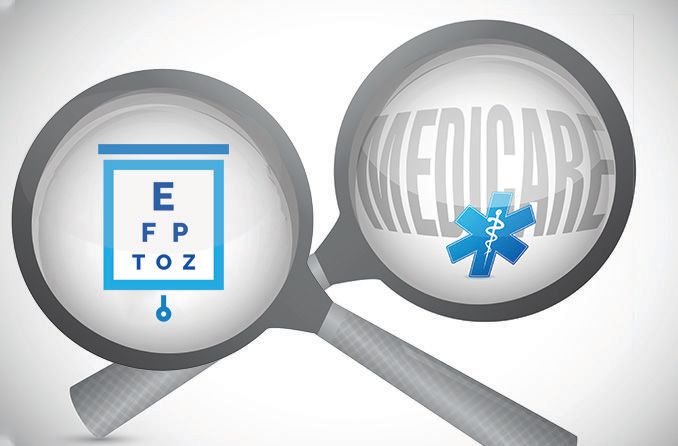Can you use Medicare for an eye exam?

Does Medicare cover eye exams?
Typically, no, Medicare will not cover a routine eye exam. However, in certain circumstances, Medicare part B will cover some expenses associated with vision testing, including:
Diabetic retinopathy exams for patients with diabetes
Glaucoma testing for individuals who are considered to be at high risk for the condition
Macular degeneration testing and treatment
There are some Medicare Advantage plans that will cover routine eye exams, but details and coverage vary depending on your location. To make sure you get a plan with annual vision care benefits, let your insurance agent know it’s a must while you’re shopping for Medicare coverage.
If you are new to Medicare or just unsure of how it works, let's take a closer look at your Medicare options:
What is Medicare and how does it work?
Medicare is a federal health insurance program for people over 65 and individuals with disabilities and certain medical conditions. There are different levels (parts) of Medicare that cover various medical expenses.
Medicare Part A is known as hospital insurance. It covers inpatient hospital stays, hospice care, nursing facility care and some home health care.
Medicare Part B is like medical insurance. It covers doctors’ visits, mental health care, lab work, medical equipment and supplies, preventive services and outpatient surgery.
When combined, Parts A and B are called Original Medicare and are overseen by the federal government.
Medicare Part C (also called Medicare Advantage) offers the most convenience of any plan because it covers everything in Parts A and B. Some plans also cover prescription drugs (Part D), dental and vision. Medicare Advantage plans are sold by private insurance retailers that are contracted with the government.
Medicare Part D is a stand-alone Medicare plan that can supplement Original Medicare with prescription drug coverage.
How often does Medicare pay for an eye exam?
Original Medicare will not cover contact lenses, eyeglasses or an eye exam, unless the exam is to diagnose or treat certain conditions. But Medicare Advantage, depending on which plan you have, can provide vision coverage.
Here’s where things can get confusing, so bear with us…
Medicare Advantage has various plan options that cover different things. There are six plans, but the most commonly used are:
Health Maintenance Organization (HMO) plans have a limited network of providers in which patients typically have to get care. The only exceptions are with emergency care, urgent care and dialysis.
Preferred Provider Organization (PPO) plans have a network of preferred medical professionals and specialists. Patients can see providers outside the PPO network, but it’s more expensive.
Because Medicare Advantage is provided by private insurance companies, the frequency that eye exams are covered may vary. An insurance agent with experience in Medicare can give you more information on the different plans and packages available.
Who accepts Medicare for an eye exam?
No eye care center will accept Original Medicare for a routine eye exam because Original Medicare does not cover eye exams. Because of this, you will be responsible for 100% of the cost of an eye exam.
If you have a Medicare Advantage plan that covers vision, the providers who accept your coverage will depend on your plan’s network and your location. It’s wise to talk with your insurance agent to discover what local practices are in your network.
How much does Medicare pay for eye exams?
If you’re footing the bill for an eye exam because your plan doesn’t cover it, you can expect to spend a good chunk of change. The national average cost of an eye exam without insurance is between $171 and $200 for your first visit, and $128 for recurring patient visits.
Below are some Medicare Advantage plans that will provide eye exams with a $0 copay.
AARP Medicare Advantage (PPO)
Cigna Health (HMO)
Humana Gold Plus (HMO)
Care N Care Choice (PPO)
WellCare Value (HMO)
The available plans and coverage depend on where you live. It's possible that some of the examples above will be different or unavailable to you, depending on your location.
For the best results, speak with a Medicare representative and let him or her know what your requirements and expectations are for your health coverage. Having a clear idea of what benefits you want will help ensure that you find the best Medicare plan for your specific needs.
NEED AN EYE EXAM? Find an eye doctor near you who accepts Medicare and book an appointment.
Page published on Tuesday, March 3, 2020






